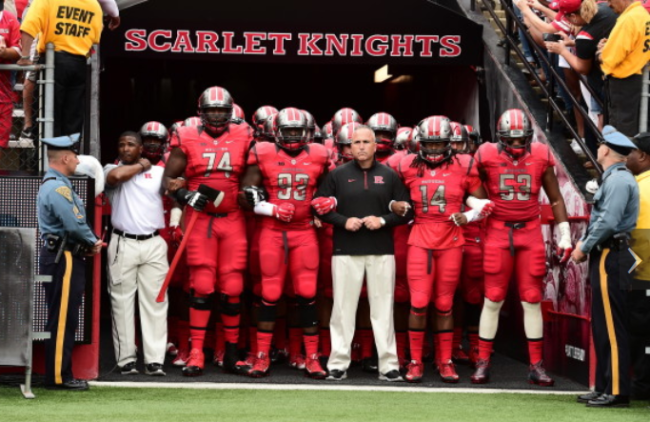You have /5 articles left.
Sign up for a free account or log in.

Kyle Flood, Rutgers University head football coach, locks arms with his players before a game.
Rutgers University
Rutgers University on Wednesday suspended its head football coach, Kyle Flood, for three games and fined him $50,000 after a university investigation found that he violated Rutgers rules by contacting a faculty member about the academic eligibility of one of his players in an attempt to improve the player's grade.
The suspension is the most recent in a string of controversies this year for the football team, including several players being involved in a series of home invasions near campus. On Saturday, following a loss to Washington State University, Rutgers' leading wide receiver was charged with assault in an alleged incident of domestic violence.
The announcement of Flood’s suspension brings to a close a three-week investigation into whether the coach violated university policy when he emailed a faculty member regarding a football player's failing grades. That player was declared academically ineligible in the spring, and was recently dismissed from the team, along with four others, after being charged with aggravated assault, riot and conspiracy to commit riot.
The professor in the case has not been named, but according to the university's faculty union, she is an adjunct professor, or what Rutgers refers to as a part-time lecturer. Many professors have said it was particularly inappropriate for one of the most powerful people on campus -- the football coach -- to pressure an adjunct lacking in the job security of tenure-track professors.
“As a member of the faculty and as a former provost myself, I know that Coach Flood’s actions in communicating with the faculty member crossed a line that all faculty hold dear,” Robert Barchi, president of Rutgers, said in a campuswide email. “Our faculty must have complete independence in executing their duties and there is a reason why we prohibit athletics coaching staff from discussing the academic standing of students with faculty.”
Flood was not available for comment and his regular media appearances this week were canceled. Barchi said the university is working with the National Collegiate Athletic Association to determine if any NCAA rules were violated.
In a report released Wednesday, the university stated that Flood “knew or should have known of well-established university policies prohibiting coach-initiated contact between coaches and members of the faculty regarding a student athlete’s academic standing.” Yet, the university said, Flood contacted a professor several times in July using the coach's personal Gmail account.
Last May, a football player became academically ineligible after receiving a poor grade, according to the account in the Rutgers report. The player emailed the professor of that course, asking if there was a way for him “to work something out.” The professor said she could not change the grade.
The player continued to ask the professor if there was a way to improve his grade, and eventually the professor emailed an academic adviser, saying that the player was “badgering" her.
Flood was soon notified of the player’s ineligibility and his interactions with the professor. In July, Flood asked the player to draft a letter to the professor “explaining his behavior last semester.” The coach forwarded the letter to the faculty member, saying, “I am sending it from my personal email to your personal email to ensure there will be no public vetting of the correspondence.”
Flood said that if the professor’s decision not to change the grade was final, then he was in “full support of that decision.” However, he added, if there was any work that could be done to earn a grade change, he would make sure the work was done during “football hours.” The professor replied, saying she was unsure how to change a grade so many weeks after it had been submitted. Flood asked if the two could meet in person, and then sent four more email messages arranging a time and place.
In August, Flood discussed the situation over the phone with an academic adviser.
“I emailed the instructor from my personal email account so it can’t be subject to an [open records] request,” Flood said, according to the adviser. “I attached a letter the student wrote, giving an explanation of his behavior last semester and I’m looking to meet with the professor.”
“Coach, you can’t have contact with the professor,” the adviser replied, according to the university report. “You certainly can’t have contact with faculty regarding grades or eligibility. This is going to be a big problem.”
Two days later, Flood -- making sure not to wear any Rutgers-branded apparel, to avoid being recognized -- met with the professor in front of the Princeton Public Library. He asked the professor if she could allow the player to write a paper to improve his grade.
The professor agreed, later sending an email to the player saying she would allow him to submit a paper as makeup work. Flood emailed the professor three more times. While the student did submit the new work, the professor did not grade the paper or change the player’s final grade. Academic advisers soon alerted university officials of the meeting.
“Although the meeting with Coach Flood was low-key and collegial, and Coach Flood’s words at the meeting were not intimidating, his position as head coach and as an important person for the university did have an intimidating effect,” the university’s report stated. “The professor conveyed to the investigator that she felt unable to resist the implied pressure from someone like Coach Flood and thus felt uncomfortable not agreeing to an additional assignment to allow the student to become eligible.”
While the university was investigating Flood’s actions, the faculty union expressed concerns of its own that Flood had intimidated instructors. Last week, the members of the union passed a resolution urging the university to launch a specific inquiry into whether any instructors felt “bullied” by the coach.
David Hughes, president of the faculty union, said he was pleased with the university's transparency and the report's thoroughness, but said that Rutgers' response "didn't go far enough to address the structural issues" that led the part-time lecturer to consider changing the player's grade. Calling the punishment a "slap on the wrist," Hughes noted that the fine Flood must pay is about 5 percent of his salary, but more than ten times what a typical adjunct faculty member usually earns for teaching a course.
"The power differential between the head coach and the part-time lecturer was so vast," Hughes said. "Let's put in a system that gives part-time lecturers the security and confidence they need to stand up to this."








